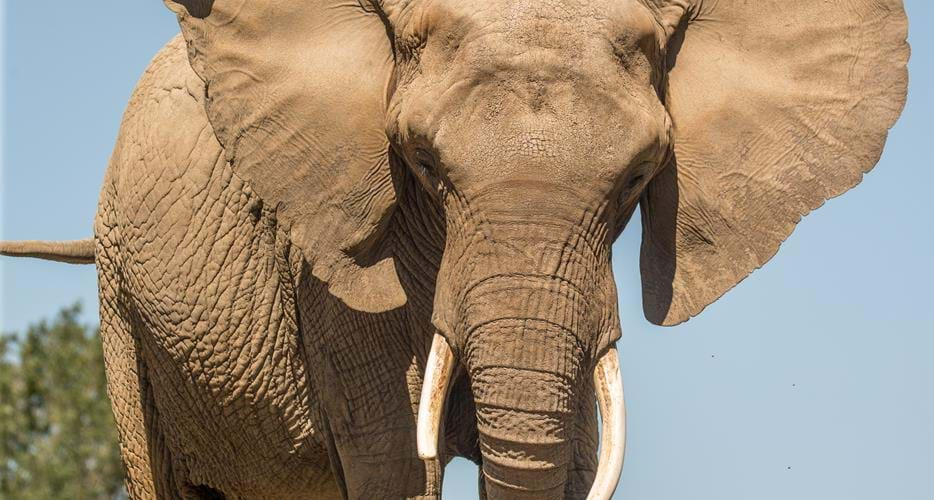Rewilding 13 elephants from Kent
Will you help the herd
We at The Aspinall Foundation are quite literally taking on our largest ever conservation challenge: flying 13 elephants - weighing 25 tonnes - more than 7,000 km across the globe to return individuals from this iconic species to their ancestral homelands.
This is the first time that a herd of elephants has ever been rewilded anywhere in the world. No elephant rewilding project of this scale has ever been attempted before.
The Aspinall Foundation aim to rewild an entire breeding herd of 13 African elephants, including 3 calves.
The elephants are currently located in a 8-acre enclosure at Howletts Wild Animal Park in Kent. The Howletts' elephant herd is one of the most successful breeding herds of African elephants in Europe. They comprise two inter related families but our intention is to rewild them as one larger herd. Although they are receiving the best care possible, The Aspinall Foundation believes that these animals belong in the wild, and that no elephants belong in captivity.

TAMMI
At the grand age of 34, Tammi is our oldest elephant, and the well-respected matriarch of the herd. A calm-natured character, she generally appreciates time on her own, preferring to socialise with the rest of the herd on her own terms.
Adopt Tammi
JARA
Teenager Jara is the bright spark of the herd. Sharp and inquisitive, she responds well to enrichment and will often be the first one to spot novel new items and find hidden food!
Adopt Jara
JAMA
15-year-old Jama is the confident socialite of the group and a natural leader. She is calm, relaxed and good-natured, enjoying attention from our keepers and interacting well with the other elephants.
Adopt Jama
UZURI
Uzuri is the placid one of the group, a well-connected elephant within the herd, who leads a little subgroup of Manzi, Juluka and Oku.
Adopt Uzuri
ETANA
The diplomat of the herd, Etana gets on well with everybody. She can be recognised by her distinctive slightly pointy forehead and very short tusks.
Adopt Etana
MANZI
11-year-old Manzi is the quirkiest elephant in the herd, with some unusual habits. She is a very noisy eater, making a clicking-gurgling sound when eating and drinking to show her contentment. She also likes a snooze during the day.
Adopt Manzi
MCHUMBA
11-year-old Mchumba is a sociable elephant who very much loves his food. Friendly and cooperative with the keepers, he loves to play fight but can be a little accident prone, having broken his right tusk twice in as many years!
Adopt Mchumba
JULUKA
Young Juluka is the adaptable one of the group, always dealing well with new situations. She is an affectionate, friendly and sociable young female who enjoys the company of the other elephants and keepers.
Adopt Juluka
IMPI
10-year-old Impi is the live wire of the group and the most energetic of the younger elephants. He can often be seen playfighting with Mchumba. Although boisterous and a little bit on the stubborn side, Impi is very gentle and trustworthy around the young calves.
Adopt Impi
MIREMBE
Mirembe is one of the most active members of the group and quite a cheeky character. She loves exploring the paddocks, forages well and is inquisitive and playful with novel enrichment items. Mirembe is very trunk-happy, often cheekily snatching things with it, especially food!
Adopt Mirembe
OKU
2-year-old Oku is a playful character, named after a mountain and lake in Cameroon. A confident little elephant, he play fights a lot with the other calves. He looks up to the older bulls, Impi and Mchumba, as his mentors, as he learns adult bull behaviour.
Adopt Oku
NGUVU
The youngest of the herd, little Nguvu lives up to his name, which is the Swahili word for powerful and energetic or ‘strong as a rock’. He is a confident, playful young calf with a mischievous and adventurous personality.
Adopt NguvuWhy we are doing it
Ensuring high animal welfare standards of elephants in captivity is a major challenge for zoos. Elephants in captivity don't live as long as their cousins in the wild. Female elephants live to half the age of their wild cousins. Elephants also don't breed well in captivity.
Rewilding captive elephants in this way will demonstrate what can be done to ensure elephants really thrive.
This will be the first time ever that a herd of elephants have been returned to Africa from Europe. We hope the spin-off effect will be that zoos no longer breed or trade in elephants globally.
What are the risks?
There will be some new risks that the elephants did not face in captivity, but our experience of rewilding projects around the globe will help guide the animals transition.
How will you get them there?
Transport of the animals will be organised by us and our partner Kester Vickery of Conservation Solutions. They have successfully translocated over 100,000 animals and are arguably the best in the industry when it comes to large scale elephant translocations. There will be veterinary support throughout translocation. Crates have been constructed for the elephants. Each crate has been customised per specific elephant.
How do we know they will be able to cope in the wild?
While this is uncharted territory, we have reintroduced other animals into the wild very successfully. Just last year, we rewilded two cheetahs Saba and Nairo back to South Africa - another Aspinall Foundation world first.
Will you help the herd?
Any donation, no matter how small, will support our team in this truly groundbreaking conservation project.
We are proud to be registered with the UK’s Fundraising Regulator.



